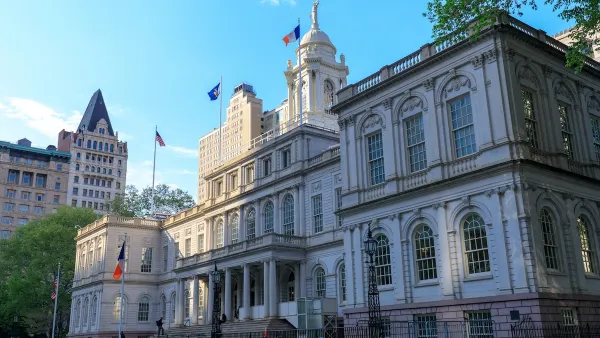This morning over at Atlantic Cities, Richard Florida aptly refuted an opinion piece by Kevin Meagher that appeared in the Guardian last week advocating for doing away with the position of Mayor in London. Florida lays out several strong arguments in favor of a strong elected mayor who can act as an advocate for his or her city.
This morning over at Atlantic Cities, Richard Florida aptly refuted an opinion piece by Kevin Meagher that appeared in the Guardian last week advocating for doing away with the position of Mayor in London. Florida lays out several strong arguments in favor of a strong elected mayor who can act as an advocate for his or her city.
In fact, I forwarded several of these same arguments in May in a piece for ULI Europe in advance of a series of referenda in twelve other cities, hoping to offer a trans-Atlantic perspective on the value of strong mayors. As we now know, all but two of those referenda failed, leaving most English cities with a Council Leader who is voted into that position by the other elected members of the city or town council.
Though Florida block-quotes a lengthy snippet of the Meagher piece, he ignores most of the second half of the column and Mr. Meagher's disclaimer of a bio: "Kevin Meagher chaired the Mayor4Sheffield campaign and was a strategist in the Yes for the North West regional assembly campaign in 2004."
Perhaps the wry British, self-deprecating humor didn't translate, but Mr.
Meagher isn't seriously proposing abolishing the Mayor of London--he's appalled
that the voters in his northern English cities don't support the cause of
strong, directly elected local leadership, a cause that he's been advocating
for at least eight years. The caption under a photograph of a frilly mayoral
frock that accompanies Meagher's piece reads "It's our
fault. With one or two notable exceptions such as Liverpool and Salford, the
north decided in May to stick with ornamental mayors." Meagher's piece is
largely a tongue-in-cheek sentiment of "tall poppy
syndrome," a British expression describing a social phenomenon
in which talented people are resented and criticized for standing out from the
field.*
I'm not as pessimistic as Meagher (but I've never lived through having my own city and 27 nearby cities reject directly elected local control). Two moves would do much to advance the idea of strong mayors with northern English cities. First, the national Department of Communities and Local Government needs to describe in more detail what the powers of the new position would be. An inexcusable amount of confusion surrounded the mysterious new role in the eyes of the electorate leading into the referenda.
Second, the referenda should be restructured so that individual candidates for the office of Mayor can run at the same time and on the same ballot as the referenda to establish the office. (This would be similar to my memory of the 2003 vote in California to recall Governor Gray Davis and--if he was recalled--elect his successor on the same ballot.) Having the candidates known in advance would help to reify the new position in the mind of the voters, and if the parties are able to find suitably charismatic candidates, then those individuals should be able to help fundraise on behalf of both the referendum and their own campaign, as well as directly convincing voters of the value of the office.

The author with the Lord Mayor of Chester in December 2011.
*Thanks to Bobby Jewell, a commenter on Florida's piece for bringing the "tall poppy syndrome" idiom into my life.

Planetizen Federal Action Tracker
A weekly monitor of how Trump’s orders and actions are impacting planners and planning in America.

Maui's Vacation Rental Debate Turns Ugly
Verbal attacks, misinformation campaigns and fistfights plague a high-stakes debate to convert thousands of vacation rentals into long-term housing.

Cuomo Is the Candidate of Both NIMBYs and Developers. What Gives?
In the New York City mayoral race, odd bedfellows align to preserve the housing status quo.

San Antonio and Austin are Fusing Into one Massive Megaregion
The region spanning the two central Texas cities is growing fast, posing challenges for local infrastructure and water supplies.

Charlottesville Temporarily Has No Zoning Code
A judge ordered the Virginia city to throw out its newly revised zoning code, leaving permitting for new development in legal limbo.

In California Battle of Housing vs. Environment, Housing Just Won
A new state law significantly limits the power of CEQA, an environmental review law that served as a powerful tool for blocking new development.
Urban Design for Planners 1: Software Tools
This six-course series explores essential urban design concepts using open source software and equips planners with the tools they need to participate fully in the urban design process.
Planning for Universal Design
Learn the tools for implementing Universal Design in planning regulations.
Heyer Gruel & Associates PA
JM Goldson LLC
Custer County Colorado
City of Camden Redevelopment Agency
City of Astoria
Transportation Research & Education Center (TREC) at Portland State University
Jefferson Parish Government
Camden Redevelopment Agency
City of Claremont






























